In the first instalment with Wilhelm Sasnal, co-director with Anka Sasnal of his adaptation of Robert Walser’s The Assistant (Czlowiek Do Wszystkiego, a highlight of the 54th edition of Film at Lincoln Center and the Museum of Modern Art’s New Directors/New Films), we are joined by ESG producer and 99 Records founder Ed Bahlman. The film (shot by Wilhelm Sasnal) includes scenes set to songs by Blod (Gustaf Dicksson), The Smiths (I Don’t Owe You Anything by Morrissey & Johnny Marr) from their 1984 début album, and ESG on 99 Records (Dance by Renee Scroggins) from their 1983 début album (come away with ESG, 99-003LP and the 1982 12” ESG Says Dance to the Beat of Moody, 99-10EP).
The Assistant, highly original and capriciously sumptuous, begins unlike the 1908 novel in a kind of present in which the protagonist Joseph Marti (Piotr Trojan) attempts to bind a book in a workshop. It doesn’t go well, he gets fired, and a friendly unemployment officer (Roman Gancarczyk, who has a Da Vinci on his wall, painted by Wilhelm Sasnal) suggests a job as assistant to the inventor Tobler (Andrzej Konopka), who lives with his wife (Agnieszka Żulewska) in a beautiful villa out of town. “Why have you come today” is his greeting. Too early, too eager the new employee seems to be. This foreboding first encounter is where Walser (who was greatly admired by Franz Kafka) begins his book about servitude and disobedience, hospitality and social norms too mystifyingly strange to ever really make sense.
Mrs. Tobler, always elegantly dressed, with a fence of rosy lace on her high-necked cream coloured top, has her fingernails painted black. There is more to her than a first glance tells. Though she doesn’t offer much to their daughter, Silvi (Suzanne Lasota), and hands most of her care over to the uncaring maid (Aleksandra Nowosadko). “The very sight of her is repulsive to me,” is not what mothers often speak out loud about a child. She prefers to read, as does Joseph, who finds it more and more complicated to figure out what his job truly entails, while being stuck perpetually between inside and out, a part of the household or underneath it.
From Los Angeles, Wilhelm Sasnal joined us on Zoom for an in-depth conversation on The Assistant.
Anne-Katrin Titze: Hello! Good morning, Wilhelm!
Wilhelm Sasnal: Good morning. Hi! Hello!
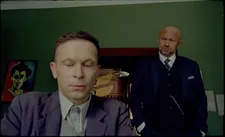 |
| Joseph Marti (Piotr Trojan) and Tobler (Andrzej Konopka) Photo: courtesy of Wilhelm Sasnal |
AKT: Seeing your take on The Assistant I was amazed how much Robert Walser has to say to us in the present, how very, very appropriate your film is in relation to the position of that man, the assistant. Were you a great Walser fan? How did it come about?
WS: Yeah, that's interesting. Because before I knew only the short stories by Robert Walser. Actually, no, that was the second one, because the first big book by Robert Walser I read before was The Robber. I didn't like it very much, but The Assistant immediately came to my heart. I loved it from the very beginning. I found the book very inspirational. I found it timeless, because it could be also about our times.
AKT: Hmm, very much so.
WS: I also knew the story of Robert Walser quite well before. His own life.
AKT: There's so much of his own experience in it; being an assistant, and being in the position of never really fitting in. He also had these kind of premonitions. I think in early works he was already writing about his end: I will go insane later on. He's a fascinating figure. And writer, of course.
WS: Yes, but also his family story. I know the biography of Robert Walser by Susan Bernofsky [Clairvoyant of the Small: The Life Of Robert Walser]. Actually, I went to Wädenswil to see the villa where the plot happened.
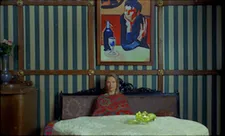 |
| Mrs Tobler (Agnieszka Żulewska) Photo: courtesy of Wilhelm Sasnal |
AKT: You did not film there, did you? Where did you shoot?
WS: I filmed everything in Poland. In Krakow and close to Krakow I found the villa, which is different than the villa of Tobler. But inside it was nearly intact from the pre-war times, so we were lucky to have this site.
AKT: Didn't Walser also work in Upper Silesia at one point?
WS: In Dąbrowa Górnicza, yes!
AKT: Is that anywhere near where you filmed?
WS: No, no, it's a little bit farther southwest of Krakow. Yes, but I know that he was a servant there.
AKT: When you first show us the villa, the music you picked for us to enter with Joseph into a different world - it reminded me a little bit of those German/Czech TV fairy-tale films of the Seventies. Do you know what I'm talking about? Three Nuts for Aschenputtel? It has the feel of: now we're going back, back, but not actually back in time, more back into a different atmosphere and state of mind.
WS: I'm full of these stories, these fairy tales and these cartoons! These cartoon films that I know from then were Czech and Polish, and all mixed up, so I know them quite well from my childhood. I think that was there, yeah, I have it within.
AKT: I saw that you did a film earlier on Hans Christian Andersen’s The Swineherd.
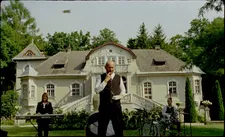 |
| A musician (Rita Sasnal) and the maid (Aleksandra Nowosadko) play for Tobler (Andrzej Konopka) Photo: courtesy of Wilhelm Sasnal |
WS: Yeah, that was very loosely inspired by The Swineherd. That's quite interesting, because I'm back and forth attracted to Andersen. Now I'm pretty much attracted to the other story of Andersen,The Shadow.
AKT: The Shadow is a great tale! The Swineherd, I must admit, I hated that tale as a child, it has such a terrible ending. I believe I insisted my grandmother had to change the ending for me because I found it so unfair.
WS: I can send you a link. This is interesting, because for me, Swineherd was the first feature film I did. I did it by myself, but with help of my wife, Anka. And then the following ones we did together. But with this one, I wrote the script for The Assistant by myself. I find The Assistant quite funny in a way. There are so many witty parts in this book, and of course I love that you know that Joseph Marti is such an inconsistent character.
AKT: Totally, yeah. One of the most inconsistent people; from the first page you wonder, is he full of himself, totally self-confident, or is he the weakest of them all?
WS: So for me, it was very funny, and I was laughing out loud when I was reading the book. And Anka, my wife, she didn't know why do I laugh, reading this book? She read the book before, and she found the book quite sad. Of course it is sad, but, on the other hand, it's very funny.
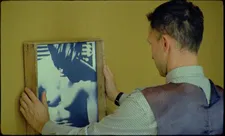 |
| Joseph Marti (Piotr Trojan) inspects a painting of The Smiths’ album cover by Wilhelm Sasnal Photo: courtesy of Wilhelm Sasnal |
AKT: You turned it into a musical in a way!
WS: Yeah.
AKT: Very organically, I think the musical numbers function in a similar way as the time travel. It's very organic. I mean, we dream this way. Everybody knows this from dreams. In dream logic everything flows into each other.
WS: For me, of course, having music that doesn't strictly refer to the certain period of time, period of history, it was very important to have sort of timeless music. I found this band from Göteborg, from Sweden, Blod, which is experimental and quite timeless, actually. That's why it works. I think there are ten pieces by this band, by Blod. So this is the most of them. There are maybe 20 pieces and maybe ten pieces are by Blod, by this Swedish band.
AKT: I want to talk about the scene near the very end, the stylised “fight scene” of the men, for which you chose ESG as the music. Why did you choose this song, Dance?
WS: For all the music, these are the bands I admire. That was the reason I found this. You know, this piece Dance is very relevant to this scene, to the dance, which is, on one hand, supposed to be serious. On the other hand, this is not serious at all. There is a threat, but there is no threat at all. It's to show that everything is sort of all play. We all play. Also Tobler, he has to be in the role of this inventor of this capitalist, but probably against his will.
AKT: The song heightens the playfulness. You said you're a fan of ESG, would you like to meet the man who discovered them and first produced them?
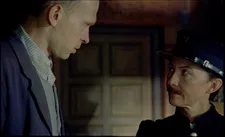 |
| Joseph Marti (Piotr Trojan) with the postmaster (Anka Sasnal) Photo: courtesy of Wilhelm Sasnal |
WS: Oh yes!
AKT: He's right here.
Ed Bahlman: Hi!
WS: Oh, hi! Oh, this is wow! Oh, that's great! You know, I love all these bands of this period, like Liquid Liquid, wow!
EB: Also on 99 Records!
WS: So nice to meet you!
EB: When Anne-Katrin came back from the press screening at MoMA, she said, I think I heard ESG! And so she got a link from Film at Lincoln Center so I could watch it. And we watched the entire film together. Beautiful use of that song! Perfect, I mean, instead of it being a club dance, it feels almost like a hardcore band the way they were dancing. Black Flag, or one of the L.A. hardcore punk bands
WS: Yeah. Yeah. Oh, that's nice. Yeah. I believe that was a sort of a pogo.
EB: And also your use of The Smiths! I had a shop 99 also, besides the record label on 99 MacDougal Street, starting in ’78. I imported directly from Rough Trade. If it came out on Friday in London, I had it in the shop on Saturday, by air freight. So the first place The Smiths album was heard here was at 99.
WS: You know it is also very interesting, because actually, this record was the first to be released by a Polish Press Company during the Communist times. Yes, in the Eighties I had a vinyl. I had The Smiths on vinyl.
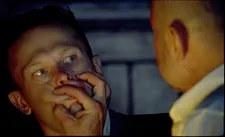 |
| Joseph Marti (Piotr Trojan) is disparaged by Tobler (Andrzej Konopka) Photo: courtesy of Wilhelm Sasnal |
EB: That's very unusual. He was openly gay, as you know. The album didn't come out in the US until a year later. The album cover that you painted of the first album, do you know where that image is from?
WS: Of course. Yeah, I know the story. Joe Dallesandro and Warhol.
EB: Paul Morrissey directed it. And there's the Morrissey connection, even more!
WS: I didn't think of it. Yes, that's right.
EB: When Tobler's proudly having his celebration with his sculpture, as it went on, Joseph is pouring the wine, and he's really happy to be a part of it, he feels, even though he's being the servant. The people are talking, and complaining, or whatever and all of a sudden what popped into my head was The Great Beauty, Sorrentino's Oscar winning film.
WS: Okay. I didn't see this. I have to admit I didn't see this.
EB: And there is another ESG connection, Moody by ESG [99-04EP] is in The Great Beauty.
WS: Whoa!
EB: Anne-Katrin interviewed him before he was even shortlisted for the Oscars and brought up ESG. And he remembered getting it in New York, the copy. And that was from their first EP [on 99 Records], and Dance from their second EP [99-10EP], and from the album come away with ESG [99-003LP].
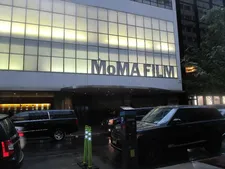 |
| The Assistant had its North American premiere at the Museum of Modern Art during New Directors/New Films Photo: Anne Katrin Titze |
WS: I know that ESG played two years ago in Los Angeles. I couldn't get tickets. They were sold out. It was full, and I know that one of them is in a wheelchair.
EB: Yeah, that's Renee, whose voice you hear singing Dance. And all that “dance dance dance” was done by me in the studio, the Radio City Music Hall studio originally. We're going to see them on Sunday, April 6, at David Geffen Hall, Lincoln Center's big venue. They're part of the Lincoln Center Presents American Songbook Singer Outsiders tribute [Gossip and ESG: Honoring Fanny]. We have press tickets for that.
AKT: By chance, your film is screening around the corner, in the same complex at Lincoln Center!
EB: So when Poland nominates and sends your film to represent the country for the Oscars, you're going to get shortlisted for sure.
WS: Well, I have to say, that for me also music was always the introduction to all the other fields when I was a teenager. Music was always the most important. I was pretty much into British music, like I listened to a lot of Joy Division and Bauhaus. They were absolutely the base for myself.
EB: A very dear friend of mine, Ruth Polsky, was booking Joy Division in America. She had the tour all laid out, and she came into my shop in tears because Rob Gretton, the manager, had left a message that they're not coming. And what had happened.
WS: Yeah, the day before, right? The day before the tour?
EB: They were supposed to come and she had on her answering machine Love Will Tear Us Apart. But then, when New Order came, 99 was the only shop you could buy advance tickets.
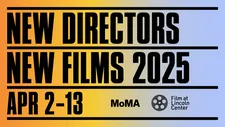 |
| New Directors/New Films 2025 |
WS: It was much different from now, because, you know, Poland as a Communist country, before I listened to them, I think the first time in ’87, still under Communism in Poland all you could get was on cassettes, was on tapes. Booklets, like Xerox copies of the books about Joy Division, and that was really it. But fortunately we had a very good radio. I mean, Poland had a very good station that wasn't much censored and actually, censorship didn't have any problems with this Western music, with British music. So they played a lot of good stuff. That's how I learned. And that was for me the introduction to the whole culture.
Coming up - Wilhelm Sasnal on food as security and weapon for Robert Walser, costume design and nail polish inspired by cars, kids on their bikes with cans, a special Polish comic book, his exhibition Painting as Prop at the Stedelijk Museum and what he painted for the film, Hitchcock’s use of artworks, Thomas Bernhard’s Frost and Francis Bacon, his love for Bruno Dumont, and what’s coming up for him and his wife Anka Sasnal.























